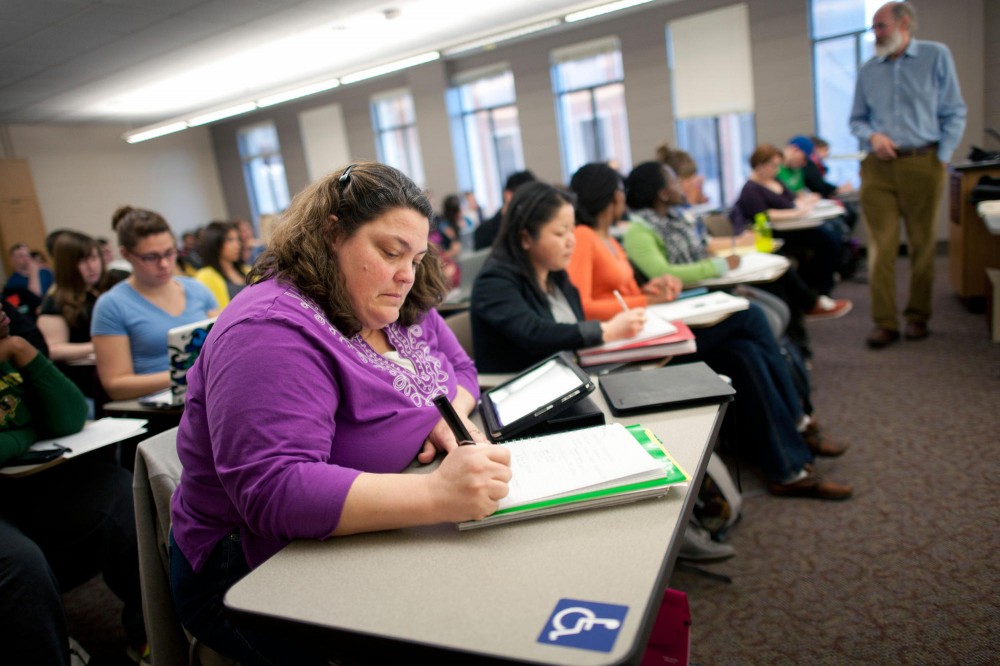Allison Brenneise was humiliated when she had to say what she thought was obvious.
âÄúIâÄôm too fat for this chair.âÄù
For 315-pound Brenneise, sitting in the stadium-style seats in Anderson Hall was not an option. She dropped the class.
Brenneise isnâÄôt the first student at the University of Minnesota to have this problem, but many donâÄôt know where to go for help.
ItâÄôs not advertised, but Disability Services provides accommodations for students requiring special seating because of their weight. Like students with disabilities, overweight students must register with the office.
âÄúWe want this University to be as accessible to everyone as it can be, and we would hope that people would choose to use our services rather than not to,âÄù said Peggy Mann Rinehart, associate director of Disability Services.
Since she started at the University, Brenneise, a communication studies and sociology senior, has sat uncomfortably in desks. If she got lucky, sheâÄôd snag a table and chair.
âÄúMostly I sucked it up,âÄù she said.
But when she tried to sit at the table and chair in one of her sociology classes at the beginning of the semester, she was told to move.
She approached the professor before class started and told him she would need accommodations for her larger size. He agreed, she said.
But next time she took her seat, she was again told to move. She was mortified to have to tell her teaching assistant the reason she couldnâÄôt.
âÄúI didnâÄôt think I had to say those words,âÄù she said.
It was the first time she asked for help.
Jeremy Todd, director of the Office of Classroom Management, said in an email that typical classroom seating has a weight capacity of 250 pounds.
âÄúI donâÄôt see where a chair and a table become disabled accommodations,âÄù Brenneise said.
Todd said classroom furniture depends on several factors like fire codes, and OCM cannot alter the quantity because of limited inventory.
Disability Services needs a student to register in order to receive accommodations, said Alicia Cordes, communications director for the Office for Equity and Diversity.
She said accommodations have been made in the past for persons of larger stature, but itâÄôs not a common problem.
Mann Rinehart said she doesnâÄôt keep track of the number of students who come in with this problem.
âÄúItâÄôs almost impossible to quantify a disability because accommodations are individual to each student, each staff needing them,âÄù Mann Rinehart said.
She and Brenneise discussed promoting this on Disability ServicesâÄô website. Mann Rinehart said she and other departments are just âÄúat the beginningâÄù of discussions.
Jumping through hoops
From 2007 to 2010, the number of self-reported obese or extremely obese males at the University increased from 2 percent to almost 10 percent. For women, that went up about a percentage point to 8.4 percent, according to a comparison of College Student Health Surveys from Boynton Health Service.
In 2010, about one out of every four females was overweight or obese, and about two out of every five males.
âÄúPeople are bigger these days âĦ WeâÄôre all different sizes, so those typical little side desks arenâÄôt made for the average person anymore,âÄù said Cheryl Brooks, disability specialist at the University of North Dakota.
UND reserved a spot on its website to inform faculty what to do in order to provide accessible seating.
âÄúâĦ some students may not have a disability-related need but do need a table and chair (e.g., a person of large stature). Faculty can make these arrangements directly âĦâÄù it said.
Brooks said because an obese person is not considered disabled, those students donâÄôt go through disability services.
It makes sense for a larger person to ask his or her professor for a desk and then receive it, Brooks said.
âÄúThey shouldnâÄôt have to go through a bunch of hoops to get it.âÄù
âÄòI donâÄôt pass as thinâÄô
Although Brenneise wrote to her professor four times, she said she never received a reply.
Instead, her adviser communicated a message from him: He thought she was of normal size and didnâÄôt make any assumptions.
Brenneise said that was disingenuous.
âÄúI donâÄôt pass as thin. I donâÄôt pass as someone who could fit in one of those seats.âÄù
She said she feels mortified each time she goes into a class with desks because people look at her and âÄúsee me crammed in.âÄù
âÄúWe all deserve to get to sit in class.âÄù


